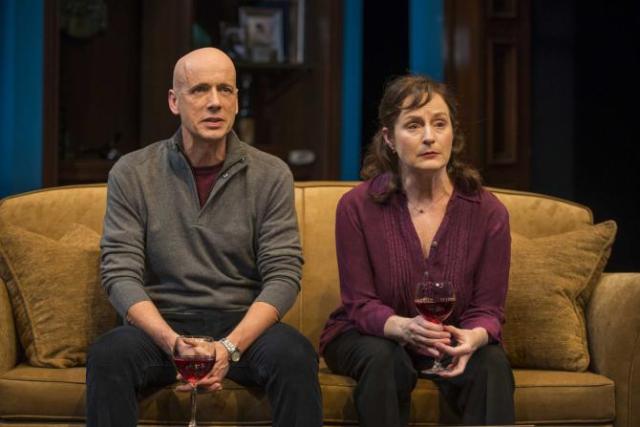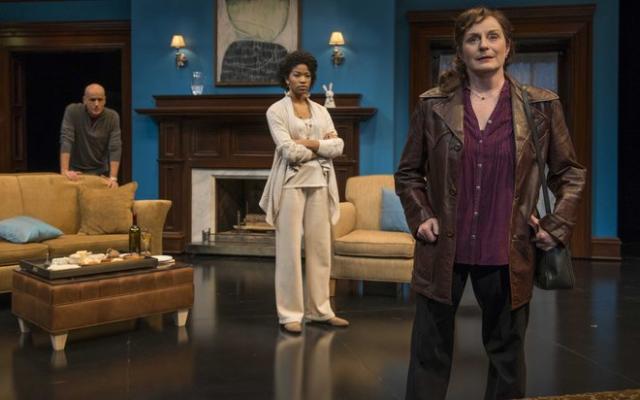

One of the best plays I’ve seen in a long time is the Milwaukee Repertory Theater’s production of Good People, a Tony-nominated play by Pulitzer Prize-winner David Lindsay-Abaire. A top notch cast, under the superb direction of Kate Buckley, brings out the essence of this multi-layered play about contemporary life. Aptly named by another critic as “the defining play of the Great Recession,” Good People takes place in urban South Boston. Residents of this poor side of town call themselves “Southies.”
The play opens in a dollar store, where a young manager must deliver bad news to middle-aged Margie Walsh (Laura Gordon). Due to her regular habit of arriving late for her shifts, he is letting her go. Margie, who has lost many a job before this, almost pleads to be reinstated. She grew up with her manager’s late mother, and invokes her name to try to get him to change his mind. No dice. She even offers to work for less pay. Again, no dice. She wants her job back not only to take care of herself, but also for the mentally challenged adult daughter in her care. None of this may sound hilarious, but the playwright has such a deft way of twisting dialogue that Good People has more than its share of funny moments. Humor is one way these characters get through each day. When Margie returns to her apartment building, she is consoled by her longtime pal, Jean (an absolutely dead-on, uproarious performance by longtime Milwaukee actor Tami Workentin). Jean - informally known as “the mouthie from Southie” - lives up to her reputation. She saves some of her best one-liners for the elderly landlord, Dottie (Laura Fisher), a widow who supplements her income with the crafts she sells as the local bingo hall. She also looks after Margie’s daughter on occasion. One can see whyGood People has become one of the most-produced plays by regional theaters across the country. It confronts the realities of those unfortunate souls who were – and are – still hurt by the recent recession. It also challenges the notion that people can rise above their circumstances if they would just make “good choices.” The play opened on Broadway in 2011, with Frances McDormand (“Fargo”) playing Margie.
McDormand’s brand of deadpan humor suits this play to a T, and Laura Gordon demonstrates her own ability in this regard. Despite her character’s lack of education, she knows that Margie isn’t stupid. She’s street smart and maybe a little too soft-hearted. For instance, when Jean tells Margie to look up a wealthy classmate as a potential employer, Margie flinches. Eventually, Jean’s nagging wins her over. Unlike Margie and the rest of those who stayed in South Boston, Mike (Michael Elich) left town and eventually become a doctor. When they meet in his office, it’s easy to see that he doesn’t want to be reminded of his roots. Margie calls him on this, and when Mike sputters his rebuttal, he ends up allowing her to come to his house (in an upscale part of town) for his birthday party. She agrees, hoping to meet one of Mike’s friends who might offer her a job.
Most of Act II takes place in Mike’s elegant home, which he shares with his wife, Kate (Jennifer Latimore), and their young daughter (who, like Margie’s daughter, we never see). Mike and Kate are having marital problems, as if to say that “having it all” doesn’t mean a life of carefree happiness. Still, Margie looks around as if she’s just stumbled into a palace. The intensity of the interaction between Margie, Mike and Kate reaches a breathtaking crescendo.
Pointedly, Margie updates Mike on all the kids they went to school with. One died of an overdose, one is in prison and one, who was an alcoholic and homeless, died recently on the street. Mike doesn’t want to hear any of this, but Kate, a younger, attractive, African-American woman, is fascinated by details of Mike’s past. Margie doesn’t mince any words in telling Mike what she thinks of him. She is as surprised as Mike at her bluntness. It’s almost as if she is unaware that even “nice” people change when the “wolf is at the door.”
The final scene takes the audience back to the bingo hall. Margie talks about her recent experience with Jean, Dottie and another friend while they are playing bingo. In a tableau at the play’s end, all of the characters are staring down at their bingo cards, except Margie. She is looking straight ahead, as if to say she’s a survivor who will fight this tough world.
The play’s realism is nicely captured by the sets. They move, smoothly and with ballet-like precision, as if carefully choreographed. The most realistic set is probably the landlord’s apartment, where Margie first reveals her jobless situation. Smooth lighting changes range from the dimly lit apartment to the brighter light of Mike’s sunny office. Costumes also reinforce the theme, from Margie’s slouchy top and pants to Mike and Kate’s more tailored outfits. Jean, looking as comical as she sounds, is seen in a number of tight-fitting, animal-print shirts that reveal her cleavage. It all comes together in this powerful play that deals with dark, real-life situations in a way that is both entertaining and heartbreaking.
